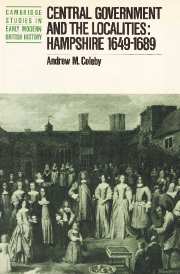Book contents
- Frontmatter
- Contents
- List of maps
- Acknowledgements
- List of abbreviations
- INTRODUCTION AND PROLOGUE
- PART I THE INTERREGNUM
- PART II THE RESTORATION
- PART III FROM THE POPISH PLOT TO THE REVOLUTION OF 1688
- 7 LOCAL OFFICE-HOLDING 1679-88
- 8 THE ENFORCEMENT OF POLICY 1679–88
- 9 COURT AND COUNTY 1679–88
- EPILOGUE AND CONCLUSION
- Bibliography
- Index
7 - LOCAL OFFICE-HOLDING 1679-88
Published online by Cambridge University Press: 14 October 2009
- Frontmatter
- Contents
- List of maps
- Acknowledgements
- List of abbreviations
- INTRODUCTION AND PROLOGUE
- PART I THE INTERREGNUM
- PART II THE RESTORATION
- PART III FROM THE POPISH PLOT TO THE REVOLUTION OF 1688
- 7 LOCAL OFFICE-HOLDING 1679-88
- 8 THE ENFORCEMENT OF POLICY 1679–88
- 9 COURT AND COUNTY 1679–88
- EPILOGUE AND CONCLUSION
- Bibliography
- Index
Summary
Central government during the 1680s in England has attracted considerable scholarly interest over the years and yet there is much about its relationship with the localities that is still obscure. This is partly because of the inordinate amount of attention which has been directed towards the necessarily ambiguous motivations of kings and such elusive còncepts as ‘absolutism’. This is surprising, as all historians agree that an absolute monarchy was not established in England in the 1680s, and Dr Miller has recently questioned whether the concept is a useful one in this particular context. Equally all historians agree that the 1680s did see the rise of a stronger more authoritarian central government in Britain, but the discussion about the impact of successive regimes upon the country has been circumscribed and little of the surviving local evidence has been tapped to answer crucial questions about the period which have hardly yet been formulated. For example, it is still unclear to what extent local government continued to function in the period 1687–9 under the strain of successive purges and re-instatements. The relationship between localism and the opposition to James II has not been explained in any depth, and it is hard on the basis of present knowledge to generalize intelligently about the continuities and contrasts between this period and those which preceded and followed it.
- Type
- Chapter
- Information
- Central Government and the LocalitiesHampshire 1649-1689, pp. 159 - 178Publisher: Cambridge University PressPrint publication year: 1987



